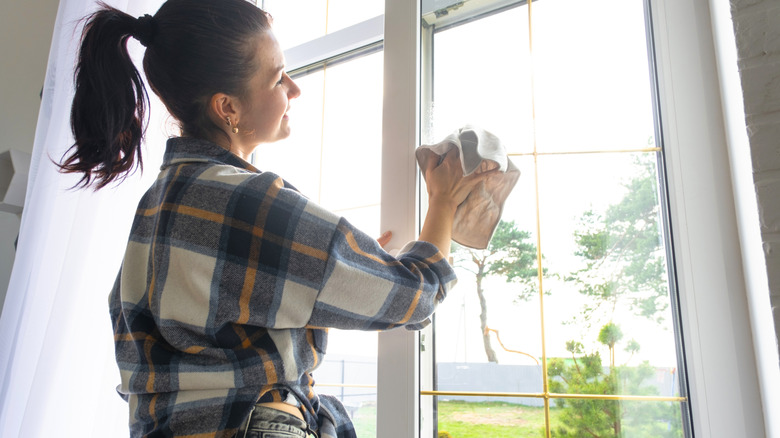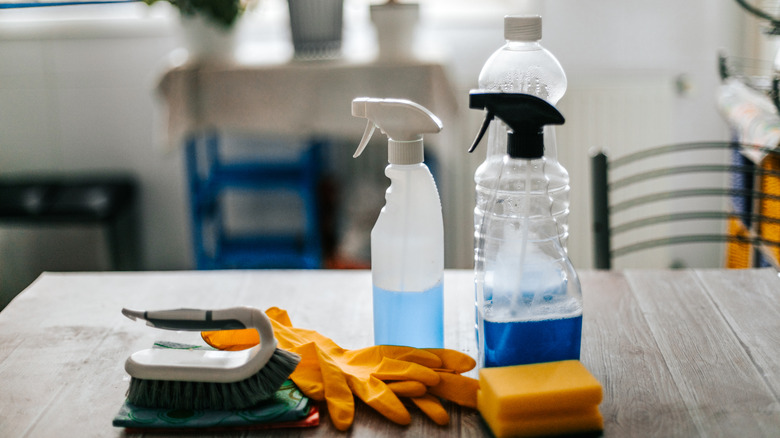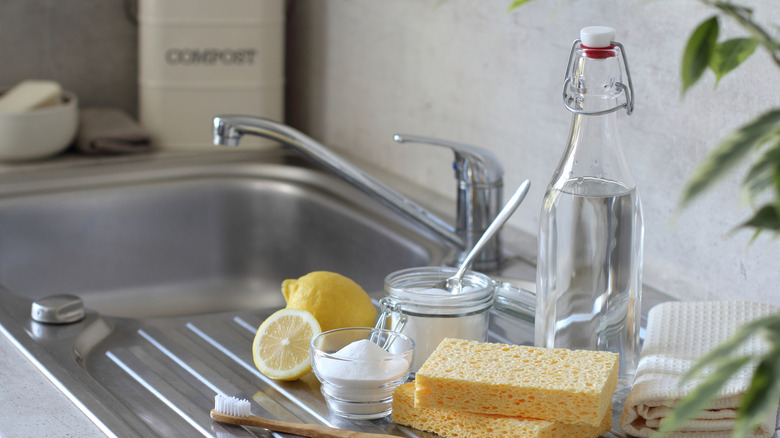The Essential Task For Spring Cleaning That Will Get You Started On The Right Foot
As the weather gets warmer, you may finally find the motivation to spring clean your home. However, before you jump into your cleaning list, complete this essential task: check on your cleaning supplies and tools. Once you get on a roll with cleaning, you won't want to stop and make a trip to the store for supplies. It's better to find out that you're low on toilet cleaner before you're sweaty and covered in dust and grime. Taking a quick inventory before you start cleaning helps you spot the supplies that are low and need to be restored or worn and need to be replaced. If you use homemade cleaners, stocking up on the ingredients and creating a fresh batch of the solution gets you ready for spring cleaning.
Going into your spring cleaning process with a plan helps you determine which supplies you need and helps you make better use of your time. All-purpose cleaners work on most surfaces, but you might want specialty cleaners for certain areas. Glass cleaner gives your windows and mirrors a streak-free clean. Cooktop cleaners make it easier to remove cooked-on food remnants from your flat-top stove. If you want to tackle specific jobs, you might want specialized tools like an upholstery cleaner to refresh your sofa or a dryer vent cleaning kit to clear lint out of the vents. With a specific to-do list and a clear plan, you can determine what cleaning tools and supplies you need for the project.
Take inventory and stock up on cleaning supplies
Start by pulling out your cleaning supplies, including the cleaning solutions, tools, and containers you use regularly. Take inventory of what you have, and check for supplies that are broken or expired so you know what to replace. If you have your spring cleaning list ready, refer to it to determine if you need any specialty cleaners or tools for projects on the list.
Check the condition of your tools — look for splayed or flattened bristles on cleaning brushes, which can scratch surfaces, or rips in your cleaning cloths to determine if you need to replace them. Also think twice about reusing a sponge around the house. Sponges frequently harbor a spectrum of bacteria, including salmonella, E. coli, and staphylococcus. While microwaving or boiling sponges may kill some of the bacteria, the cleaning tools could still have enough germs to contaminate the surfaces you clean, so starting with fresh sponges prevents that issue.
For your cleaning solutions, check for expiration dates to make sure they'll still be effective. After the expiration date, the product might not be as effective because the active ingredients often lose potency. Your disinfectants might not kill as many germs, for example. The smell of older cleaning products might also change with age. Using expired products won't likely harm the surfaces you clean, but the cleaning results might not be what you expect.
Gather items for cleaning solutions
Restocking in preparation for spring cleaning doesn't always require a trip to the store. If you clean with DIY products, you may simply need to prepare a fresh batch of cleaning solutions. DIY vinegar cleaning solutions are common for creating effective, non-toxic cleaners for multiple surfaces. Vinegar's acidity helps clean surfaces without using harsh chemicals. Grab a large jug of distilled vinegar if you're running low to ensure you can refresh your solution as you go. It's also a good idea to check on your spray bottles to make sure you have enough containers for your DIY cleaners. Test the sprayers on your old bottles to make sure they still work well.
Adding essential oils to homemade cleaning solutions adds an appealing, fresh scent to your home, and the oils can help deodorize your home. Ideal spring scents include florals, citrus fruits, and fresh herbs, but you can use any combination of scents you prefer. Lavender is an inviting floral scent that you can use in surface cleaners and DIY linen sprays for a relaxing feel. Try peppermint in your DIY glass cleaner for an invigorating herbal scent. Lemon offers an uplifting scent that you can add to cleaners with either essential oil or lemon juice. However, the acidity of lemon juice can make it damaging on some surfaces, including hardwood floors, natural stone, chrome, and cast iron, so use it with caution.


